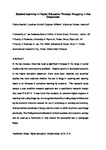Student learning in higher education through blogging in the classroom
| dc.contributor.author | Garcia, E | |
| dc.contributor.author | Moizer, J | |
| dc.contributor.author | Stephen, W | |
| dc.contributor.author | Haddoud, MY | |
| dc.date.accessioned | 2019-04-01T09:26:14Z | |
| dc.date.issued | 2019-07 | |
| dc.identifier.issn | 0360-1315 | |
| dc.identifier.issn | 1873-782X | |
| dc.identifier.uri | http://hdl.handle.net/10026.1/13592 | |
| dc.description.abstract |
In the last decade, there has been a significant increase in the range of social media tools that have become available. Despite reports of successful adoption in the higher education classroom, there have been relatively few empirical studies that have explored whether the use of blogs in teaching and learning leads to an increase in perceived learning by students. This research study adopts a post positivist research approach and a quantitative research design that uses PLS-SEM. It was found that students do perceive higher degrees of learning from using blogs, but the recognised benefits of using blogs is influenced by the students’ attitudes towards the use of technology in teaching and learning, their perceived usefulness of blogs, and the extent to which they have used blogs previously. The findings have implications for both teachers and students, as they can be used as a framework to help ensure the successful use of pedagogic blogs. | |
| dc.format.extent | 61-74 | |
| dc.language | en | |
| dc.language.iso | en | |
| dc.publisher | Elsevier | |
| dc.subject | Blogs | |
| dc.subject | Higher education | |
| dc.subject | Social media | |
| dc.subject | SEM | |
| dc.subject | PLS | |
| dc.title | Student learning in higher education through blogging in the classroom | |
| dc.type | journal-article | |
| dc.type | Article | |
| plymouth.author-url | https://www.webofscience.com/api/gateway?GWVersion=2&SrcApp=PARTNER_APP&SrcAuth=LinksAMR&KeyUT=WOS:000467892100005&DestLinkType=FullRecord&DestApp=ALL_WOS&UsrCustomerID=11bb513d99f797142bcfeffcc58ea008 | |
| plymouth.volume | 136 | |
| plymouth.publication-status | Published | |
| plymouth.journal | Computers and Education | |
| dc.identifier.doi | 10.1016/j.compedu.2019.03.011 | |
| plymouth.organisational-group | /Plymouth | |
| plymouth.organisational-group | /Plymouth/Faculty of Arts, Humanities and Business | |
| plymouth.organisational-group | /Plymouth/Faculty of Arts, Humanities and Business/Plymouth Business School | |
| plymouth.organisational-group | /Plymouth/REF 2021 Researchers by UoA | |
| plymouth.organisational-group | /Plymouth/REF 2021 Researchers by UoA/UoA17 Business and Management Studies | |
| plymouth.organisational-group | /Plymouth/Users by role | |
| plymouth.organisational-group | /Plymouth/Users by role/Academics | |
| dcterms.dateAccepted | 2019-03-24 | |
| dc.rights.embargodate | 2020-9-25 | |
| dc.identifier.eissn | 1873-782X | |
| dc.rights.embargoperiod | Not known | |
| rioxxterms.versionofrecord | 10.1016/j.compedu.2019.03.011 | |
| rioxxterms.licenseref.uri | http://www.rioxx.net/licenses/all-rights-reserved | |
| rioxxterms.licenseref.startdate | 2019-07 | |
| rioxxterms.type | Journal Article/Review |


